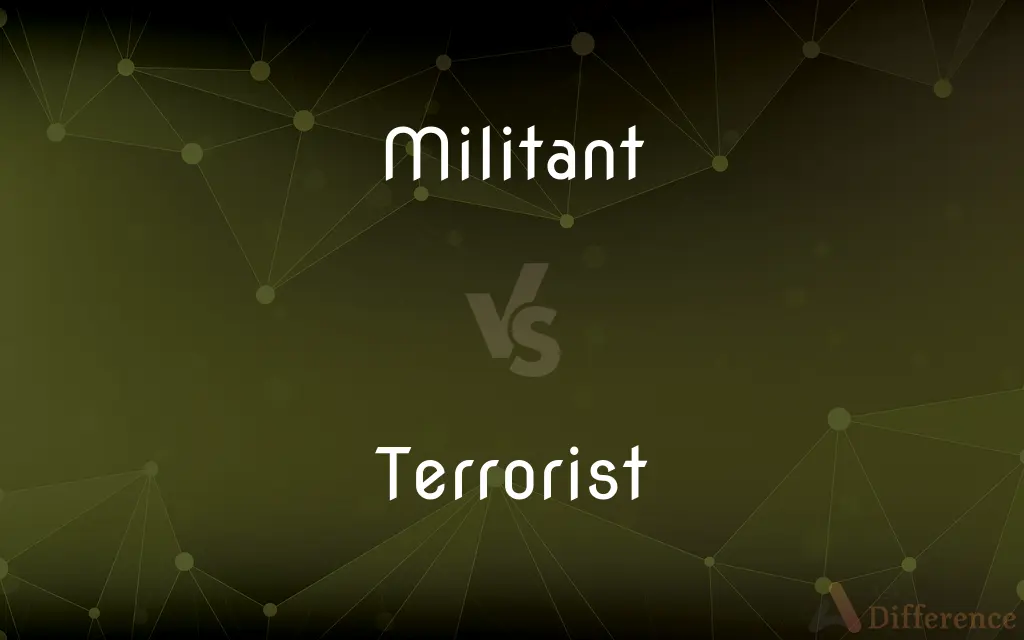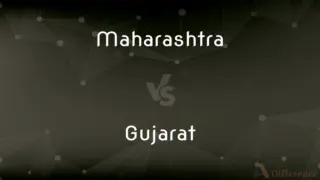Militant vs. Terrorist — What's the Difference?
By Tayyaba Rehman — Updated on October 22, 2023
Militants are aggressors advocating for a cause, terrorists use violence causing fear for political aims.

Difference Between Militant and Terrorist
Table of Contents
ADVERTISEMENT
Key Differences
The term "militant" is often used to describe someone who is vigorously active, combative, and aggressive, especially in support of a cause, like environmental militants fighting against global warming. In contrast, "terrorist" refers specifically to individuals who use unlawful violence and intimidation, especially against civilians, in pursuit of political aims. The terrorist's main tools are fear, destruction, and chaos, often used to destabilize societies and governments.
Militants often engage in what they see as a fight for rights or justice, potentially through forceful means, but within certain moral or ethical codes. Terrorists, on the other hand, are known to create an atmosphere of fear by harming individuals or threatening societal safety, often dismissing any rules of warfare or moral standards.
While militants can operate within a range of tactics from peaceful protesting to extreme actions, their operations are often characterized by a form of resistance against an established authority or an occupying power. Conversely, terrorists primarily aim to create terror and panic, frequently targeting random civilians and neutral entities, which is usually considered beyond the realm of legitimate political struggle.
Militants might see themselves as warriors for justice, sometimes forming organized groups opposing specific policies or situations, their actions, even if aggressive, are often meant to effect societal or governmental change without widespread fear. Terrorists, however, typically aim to disrupt normalcy and create fear beyond their immediate targets, influencing broader audiences and governments through acts of extreme violence and brutality.
Militants and terrorists can sometimes intersect, depending on an individual's or group's tactics and the observer's perspective. One side's "freedom fighter" can be another's terrorist, depending on the narrative, the context, and who is telling the story. Understanding both terms requires acknowledging the complex interplay of ethics, politics, and societal norms.
ADVERTISEMENT
Comparison Chart
Objective
Seeks to advocate or enforce ideals.
Aims to create fear to achieve political goals.
Targets
Often directed at specific entities or state apparatus.
Generally indiscriminate, high civilian impact.
Methods
Uses force but usually within ethical/moral boundaries.
Employs extreme violence, often violating human rights.
Legality
Operates in legal grey areas, sometimes within the law.
Acts are typically illegal and universally condemned.
Perception
Viewed differently across legal and cultural contexts.
Universally viewed negatively due to targeting civilians.
Compare with Definitions
Militant
A militant operates with vigor and deep commitment, often not deterred by the need to engage in hostile actions.
The militant leader's speech inspired those disenfranchised to resist the oppressive regime.
Terrorist
A terrorist is someone who perpetrates acts that disrupt societal norms, intending to achieve political or ideological goals.
The terrorists' attack on the transportation infrastructure paralyzed the city.
Militant
A militant is someone aggressively active in advancing a political or social cause.
The militants organized a large rally to demonstrate their commitment to environmental reform.
Terrorist
A terrorist is an individual who uses unlawful violence and intimidation against civilians for political aims.
The terrorists detonated a bomb in a crowded market to sow fear across the city.
Militant
A militant advocates for a cause with a forceful demeanor, often challenging societal norms or policies.
The militant activists were prepared for confrontation with the authorities at the protest.
Terrorist
An agent or partisan of the revolutionary tribunal during the Reign of Terror in France.
Militant
A militant can be part of an organization or movement employing aggressive methods of protest or resistance.
The government considered the environmental group to be militants due to their extreme tactics.
Terrorist
A terrorist acts as part of an organization that deliberately creates an atmosphere of fear to gain power or influence.
The terrorist group's threats disrupted the nation's sense of security.
Militant
The English word militant is both an adjective and a noun, and is generally used to mean vigorously active, combative and/or aggressive, especially in support of a cause, as in "militant reformers". It comes from the 15th century Latin "warrior" meaning "to serve as a soldier".
Terrorist
A terrorist uses extreme methods, often targeting ordinary people, intending to create a climate of fear.
The terrorists took hostages in the mall, causing widespread panic.
Militant
Fighting or warring.
Terrorist
A person who uses unlawful violence and intimidation, especially against civilians, in the pursuit of political aims
A suspected terrorist
Four commercial aircraft were hijacked by terrorists
Militant
Having a combative character; aggressive, especially in the service of a cause
A militant political activist.
Terrorist
Unlawfully using violence and intimidation, especially against civilians, in the pursuit of political aims
A terrorist organization
Terrorist attacks
Militant
A fighting, warring, or aggressive person or party.
Terrorist
A person who engages in terrorism.
Militant
Fighting or disposed to fight; belligerent, warlike.
Terrorist
Of or relating to terrorism.
Militant
Aggressively supporting of a political or social cause; adamant, combative.
Terrorist
A person, group, or organization that uses violent action, or the threat of violent action, to further political goals.
Militant
(obsolete) A soldier, a combatant.
Terrorist
Of or relating to terrorism.
Militant
An entrenched or aggressive adherent to a particular cause, now especially a member of a particular ideological faction.
Terrorist
One who governs by terrorism or intimidation; specifically, an agent or partisan of the revolutionary tribunal during the Reign of Terror in France.
Militant
Specifically, someone who supports the Trotskyist political view expressed in the newspaper Militant, or who engages in aggressive left-wing politics.
Terrorist
One who commits terrorism{2}.
Militant
Engaged in warfare; fighting; combating; serving as a soldier.
At which command the powers militant . . .Moved on in silence.
Terrorist
A radical who employs terror as a political weapon; usually organizes with other terrorists in small cells; often uses religion as a cover for terrorist activities
Militant
A militant reformer
Terrorist
Characteristic of someone who employs terrorism (especially as a political weapon);
Terrorist activity
Terrorist state
Militant
Engaged in war;
Belligerent (or warring) nations
A fighting war
Terrorist
A terrorist violates ethical or humanitarian norms, often prioritizing propaganda of the deed.
The brutal acts of the terrorists were broadcasted online to spread their message of hate.
Militant
Showing a fighting disposition without self-seeking;
Highly competitive sales representative
Militant in fighting for better wages for workers
His self-assertive and ubiquitous energy
Militant
A militant is a member of an armed group fighting against an established authority or an occupying power.
The militants took up arms seeking autonomy for their region.
Common Curiosities
Can a militant be a terrorist?
Depending on their actions, a militant can be labeled a terrorist if they resort to tactics of fear, intimidation, and public harm.
Do terrorists have a cause?
Terrorists usually have a political or ideological cause, but their methods involve extreme violence against civilians to create fear.
Are all militants violent?
No, militants can engage in non-violent advocacy or resistance; the key factor is their aggressiveness in promoting a cause.
Are all terrorists criminals?
Legally, yes, terrorism is a criminal act, as it involves violence, human rights violations, and breaches of international law.
Can a political activist be a militant?
Yes, if their approach is particularly aggressive or combative, they might be considered militants.
Why do terrorists target civilians?
Terrorists aim to create public fear and pressurize governments, seeing civilian targeting as a way to gain maximum attention and impact.
What drives individuals towards terrorism?
Factors include political grievances, ideological beliefs, perceived injustices, and coercion by terrorist groups.
What defines a militant?
A militant is someone vigorously active and aggressive, often advocating for a social or political cause.
Do militants have public support?
Some militants might, as they can be seen as fighting for community or societal rights, though methods can sway public opinion.
What's the difference in goals between militants and terrorists?
Militants aggressively advocate for change; terrorists use fear to influence political or ideological outcomes.
Are there peaceful militants?
Yes, being militant refers to the intensity of advocacy, not necessarily the use of violence.
How does international law view terrorism?
International law condemns terrorism, advocating for prosecution, and promoting global cooperation against terrorist activities.
Is there a global consensus on what constitutes militancy?
No, perceptions of militancy vary by country, culture, and political perspective.
Are militant actions legal?
Not always. While some actions might be legal forms of protest, others, especially violent ones, could be considered illegal.
Can terrorists be state-sponsored?
Yes, some terrorists receive support from states, often covertly, to pursue mutual political interests.
Share Your Discovery

Previous Comparison
Maharashtra vs. Gujarat
Next Comparison
Baseband vs. PassbandAuthor Spotlight
Written by
Tayyaba RehmanTayyaba Rehman is a distinguished writer, currently serving as a primary contributor to askdifference.com. As a researcher in semantics and etymology, Tayyaba's passion for the complexity of languages and their distinctions has found a perfect home on the platform. Tayyaba delves into the intricacies of language, distinguishing between commonly confused words and phrases, thereby providing clarity for readers worldwide.
















































